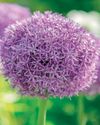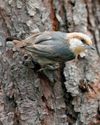
1 Golden Zebra daylily
HEMEROCALLIS ‘MALJA’, ZONES 4 TO 9
With more than 90,000 daylily cultivars, there’s one for you! This beauty has dark yellow flowers that peak in early summer and slender leaves variegated with creamy white edges. As its name implies, each bloom comes and goes in one day.
Why we love it: This daylily grows well in most soils in full sun or part shade. It is striking when in bloom, and when it’s not, the leaves add plenty of appeal on their own.
2 White Nancy spotted deadnettle
LAMIUM MACULATUM, ZONES 3 TO 8
Imagine if a quick frost partially covered leaves in your garden, only they didn’t die. That’s how the leaves on White Nancy spotted deadnettle look—as though they were kissed by frost in early summer. The dainty white blooms of this ground cover are a bonus.
Why we love it: Deadnettle spreads easily, making it a perfect low-maintenance ground cover in part or full shade areas of the garden. Be aware: It can be invasive.
3 Bengal Tiger canna lily
CANNA AMERICANALLIS VAR. VARIEGATA, ZONES 8 TO 11
Bengal Tiger’s leaves are mesmerizing as light yellow and dark green weave back and forth. Showstopping orange flowers top the plant’s tall stalks, which reach as high as 6 feet. The leaves themselves are remarkable on their own. Gardeners in the North will want to dig up canna bulbs and store them indoors for winter.
Why we love it: It thrives in a wide range of soils or as an aquatic plant, living in 6 inches of water.
Denne historien er fra August/September 2021-utgaven av Birds & Blooms.
Start din 7-dagers gratis prøveperiode på Magzter GOLD for å få tilgang til tusenvis av utvalgte premiumhistorier og 9000+ magasiner og aviser.
Allerede abonnent ? Logg på
Denne historien er fra August/September 2021-utgaven av Birds & Blooms.
Start din 7-dagers gratis prøveperiode på Magzter GOLD for å få tilgang til tusenvis av utvalgte premiumhistorier og 9000+ magasiner og aviser.
Allerede abonnent? Logg på

Basics of Hydroponics
Use these top tips and plant picks to have a successful soil-free garden

Rooted in Resilience
These hardy perennials will thrive in most zones

Social and Supportive
Brown-headed nuthatches take a helpful approach to raising their young

All About Owl Pellets
And why you should give a hoot about them

Ask the Experts
Advice from our pros about houseplants, bird feeding and more

BRING THE OUTDOORS IN
Making a terrarium is about as close as you can get to a Zen DIY project. Once you have gathered the proper materials and squared away your plant selections, it's as simple as layering it all together and watching your mini ecosystem thrive. Here, I'll walk you through my foolproof process and cover all the required elements for good filtration, healthy soil, strong root growth and resistance against fungus and disease.

GROW THIS. NOT THAT
Six easy-to-grow houseplants—and six that may not be the right choice for you

Winter MAGIC
Forecasts may be frigid, but grab your binoculars because birding opportunities are still incredible

Sense or Nonsense? - Why some birds can taste and smell - but others can't
Does a porcelain berry taste like a blueberry to a gray catbird? Does a block of lard smell like frying bacon to a northern flicker? The short answer is no. While some avian species do have a well-adapted sense of taste or smell, they can't distinguish between flavors and odors the way humans can. They're not picking up every ingredient in the suet you put out, says José Ramírez-Garofalo, an ornithology researcher at Rutgers University in New Jersey and the director of Freshkills Biological Station in Staten Island, New York.

Maple Mania - Amazing facts about this fall foliage mainstay
Amazing facts about this fall foliage mainstay